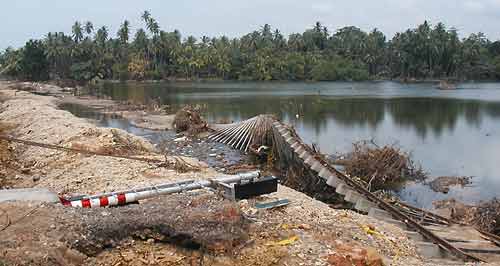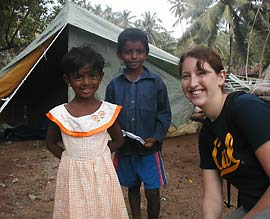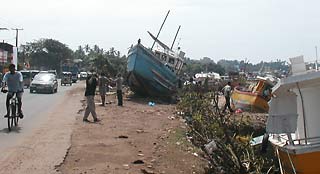UC Berkeley Press Release
 These railroad tracks in Sri Lanka's Galle District were washed out by the force of the Dec. 26 tsunami. (Photos courtesy Anne Marie Edwards) |
Clausen Center teams up to raise funds to rebuild Sri Lanka
BERKELEY – The Clausen Center for International Business and Policy at the University of California, Berkeley's Haas School of Business has teamed up with an online events organizer on a novel approach to help raise funds to aid a Sri Lankan organization working to rebuild the tsunami-ravaged country.
The experience of a Haas student who assisted with Sri Lankan relief efforts in January was a catalyst for the project in which the center and Acteva are assisting the Sewalanka Foundation. Sewalanka, a non-governmental organization, is helping communities in Sri Lanka's most disadvantaged and neglected regions.
In the past, contributions to Sewalanka from the United States could be made only through a wire transfer or by sending a check through the mail, said Sebastian Teunissen, executive director of the Clausen Center and an adjunct professor at the Haas School. The new arrangement with Acteva and Sewalanka enables quick and easy donations via credit card.
Another plus, Teunissen said, is that Acteva maintains contact information so that Sewalanka can report back to donors about what is being accomplished and even send photos as a project gets finished or a new one begins.
 Haas MBA student Anne Marie Edwards, posing with Sri Lankan children in a refugee camp, helped set up a novel tsunami-relief fund-raising program after traveling to the storm-wracked nation. |
"Donors can feel that they are involved in this," said Anne Marie Edwards, a 27-year-old Haas MBA student who helped set up the system. They can say, 'I didn't just give money, I bought uniforms for a child.' It's more inspiring for the donor."
Edwards was en route to Sri Lanka in late December to volunteer for an eco-tourism project with Sewalanka. She arrived in the Galle District on a devastated and ship-strewn southern coast just days after the tsunami hit. Edwards immediately went to work, logging about 20 hours a day on projects to distribute water and food, install temporary toilets, clear homes, set up tents, and assess needs in various parts of the country.
Because Sewalanka has operated for 10 years in Sri Lanka and three years in the Galle District -- largely dealing with repercussions of the country's long running rebel conflict and the relief needs it has generated -- it was relatively easy for the organization to respond fast to the tsunami destruction, Edwards said.
But while authorities hope to have significant reconstruction finished within approximately 18 months, she said, it will take years for Sri Lanka to return to its pre-tsunami health.
 The tsunami left boats tossed like driftwood along the edge of a busy road in Galle. |
Edwards started fundraising right after the tsunami. Drawing from other Haas students and "twenty-somethings," she said, she collected an impressive $2,200 in one day. When she returned to Berkeley from Sri Lanka, she and Teunissen talked about the center getting involved.
"We said, 'We have to do something to help,'" Teunissen said.
Edwards said it was the ability to help "that absolutely sustained me" after witnessing the destruction wreaked by the tsunami that displaced about a million Sri Lankans and killed 31,000.
"Her experiences and the vivid descriptions of the need for assistance were instrumental in mobilizing the Clausen Center and Acteva to create this alliance with Sewalanka," Teunissen said.
All donations go directly to the foundation, and Acteva is donating to the relief effort all fees it would normally charge for its services, he said. Donations are not yet tax deductible, but Edwards said that is expected to change very soon.
The Web site for donating to Sewalanka is www.acteva.com/go/slf. The foundation's own Web site is at http://www.sewalanka.org/index.htm.
Four projects recently financed by contributions to Sewalanka include providing school supplies and uniforms to 230 children, offering emergency help to 120 university students and 250 school children affected by the tsunami, supporting the job recovery of 422 lagoon fishermen, and getting dry food to 600 families.

